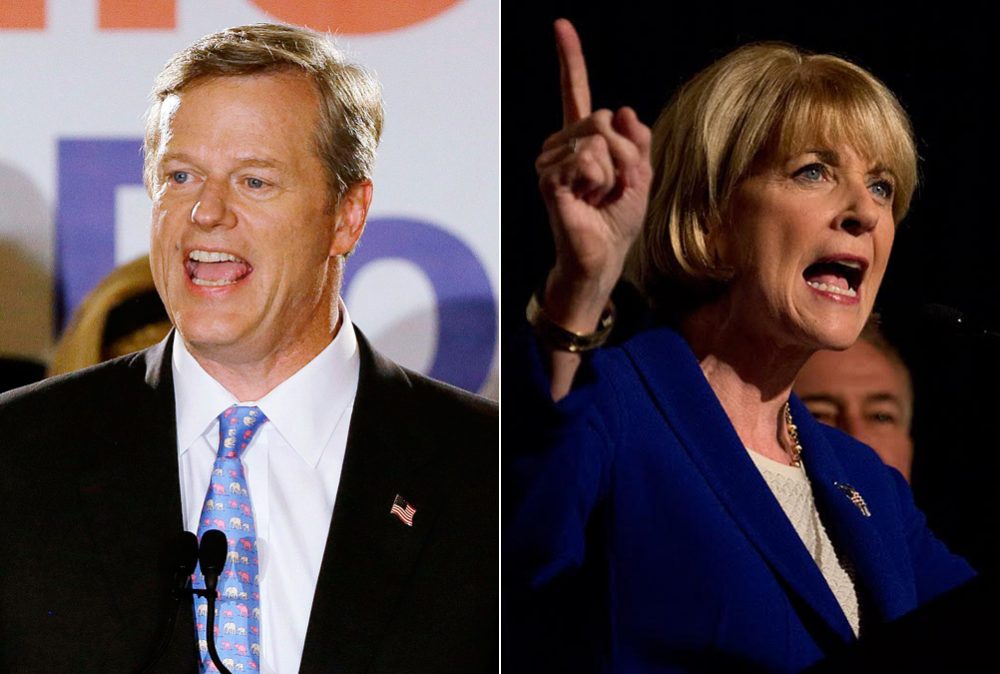Advertisement
In The Race For Massachusetts Governor, Victory May Be In The Details

Charlie Baker did something last week that most cynical campaign consultants tell their gubernatorial candidate to avoid: He provided specifics about what he’ll do if elected governor. Baker’s plan, the product of a sustained effort over the duration of his campaign, is surprisingly comprehensive. It is consistent with his market-based, government-accountability policy values, and it reflects how he believes the world works, at least in Massachusetts.
...a voter might reasonably conclude that the candidates should move beyond platitudes and sound bites and talk in detail about how they would create sustainable jobs and develop the economy in Massachusetts.
With former governor and character reference Bill Weld at his side, Baker laid out his vision for developing the state’s economy. It was particularly timely, as it preceded by one day the release of economic data showing Massachusetts losing about 5,300 jobs in August, pushing the state’s unemployment rate up to 5.8 percent. It’s also significant in light of data released the same day by the U.S. Census Bureau that indicates that the percentage of children living in poverty in Massachusetts has gone up, and the state’s median income has remained flat, below the 2007 level.
These troubling numbers reveal persistent middle-class struggles after nearly eight years of Patrick administration policies. Given them, a voter might reasonably conclude that the candidates should move beyond platitudes and sound bites and talk in detail about how they would create sustainable jobs and develop the economy in Massachusetts.
Baker’s plan integrates tax, education, health care, local aid and energy policies into a macro approach that anticipates that policy decisions in one area may affect outcomes in other areas. For instance, Baker argues that the state must establish smart policy coordination between “secondary education, higher education, workforce development and job creation,” because there is a symbiotic relationship across these areas, and they can’t be addressed in a bureaucratic vacuum. It’s rare for elected officials – let alone a candidate — to connect the dots in this way.
In contrast, Martha Coakley’s economic plan was relaunched last week in a few phrases in a 30-second television ad. The Coakley campaign’s first cut at a plan was a document listing some broad goals posted to her website during the primary that was so vague it appeared cobbled together at the last minute, prompting her Democratic primary opponent, Treasurer Steve Grossman, to call it “fake” in early September.
Rather than respond to the release of Baker’s plan with some substance of its own, the Coakley campaign attempted to redirect the conversation to non-issues. This served mainly to underscore her apparent lack of specifics — or, in any case, her reluctance thus far to articulate them.
Coakley called on Baker to release his employment contract with General Catalyst after the state of New Jersey announced it had sold its stake in the firm. There was no mention that the stake returned 46 percent over three years for New Jersey’s public pension holders.
Advertisement
And just for good measure, Coakley’s spokesperson tried to show that Baker isn’t on the side of women. Why? Because he hadn’t called for NFL Commissioner Roger Goodell to be fired in the wake of the Ray Rice domestic violence episode in a New Jersey hotel elevator. (Baker has since called for Goodell to resign.) Why should the fact that the governor of Massachusetts has no jurisdiction over the NFL commissioner get in the way of a darn good campaign hit? They don’t call it the ‘silly season’ for nothing.
In matters of substance, Coakley’s response did note, correctly, that Baker didn’t explain how his administration would cover the $250-300 million cost of his plan’s proposed tax incentives. This is something that Baker will eventually need to address, because it will come up again.
The Coakley campaign also chose to fall back on stock campaign clichés: Namely, playing up economic class differences. They pit Baker’s lack of support for November’s Ballot Question 4, which seeks to mandate paid sick leave for all small business employees, against his proposed tax incentives for businesses that employ fewer than 50 people. The Coakley campaign refers to those businesses as “corporations” and leaves out the fact that Baker has proposed alternatives to the sick leave mandate.
Recent polls suggest the electorate may want more substance from the Coakley campaign and that it may, indeed, need to flesh out an economic program.
Recent polls suggest the electorate may want more substance from the Coakley campaign and that it may, indeed, need to flesh out an economic program.
A Rasmussen poll released on Sept. 21 shows Baker and Coakley tied at 42 percent — a stubborn Baker deficit having apparently vanished. The results of a Boston Globe poll released late last week showed Coakley with a three-point lead over Baker among likely voters. Nineteen percent of those polled, including a quarter of Democrats and 70 percent of unenrolled voters, hadn’t yet made up their minds.
Coakley’s aggregate numbers also remain mired dangerously in the 40 percent range, similar to the percentage of voters she was able to win over in the Democratic primary. Her campaign needs a reboot.
The Baker campaign, meanwhile, reflects its candidate’s personality and is following his lead by digging into policy — and talking about it with voters. By so doing, Baker’s camp has dared the other side to engage in debate and to get specific. The electorate will soon find out if the Coakley campaign accepts the challenge or hides behind the empty distraction of negative television ads to wage its own offensive.
Related:
